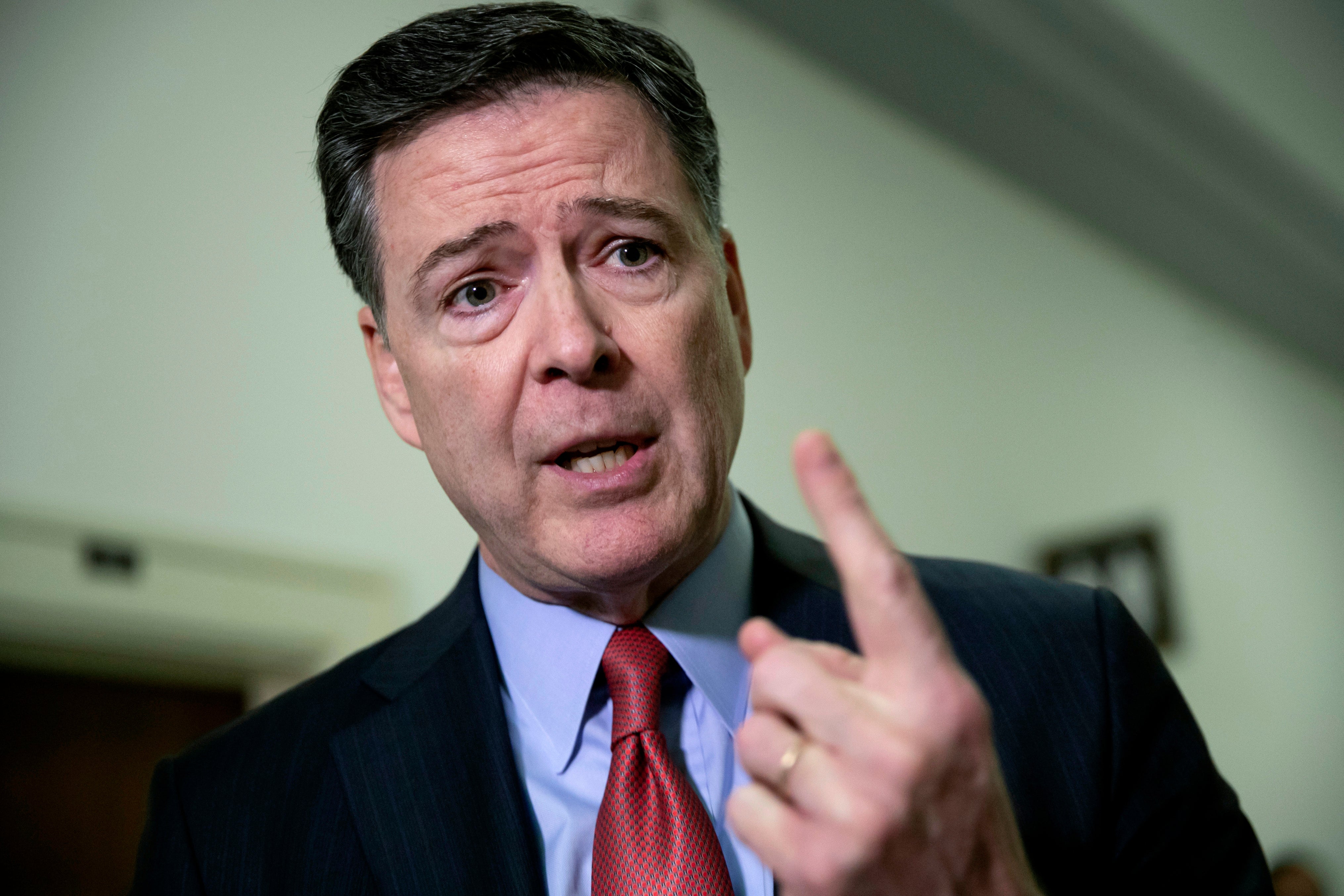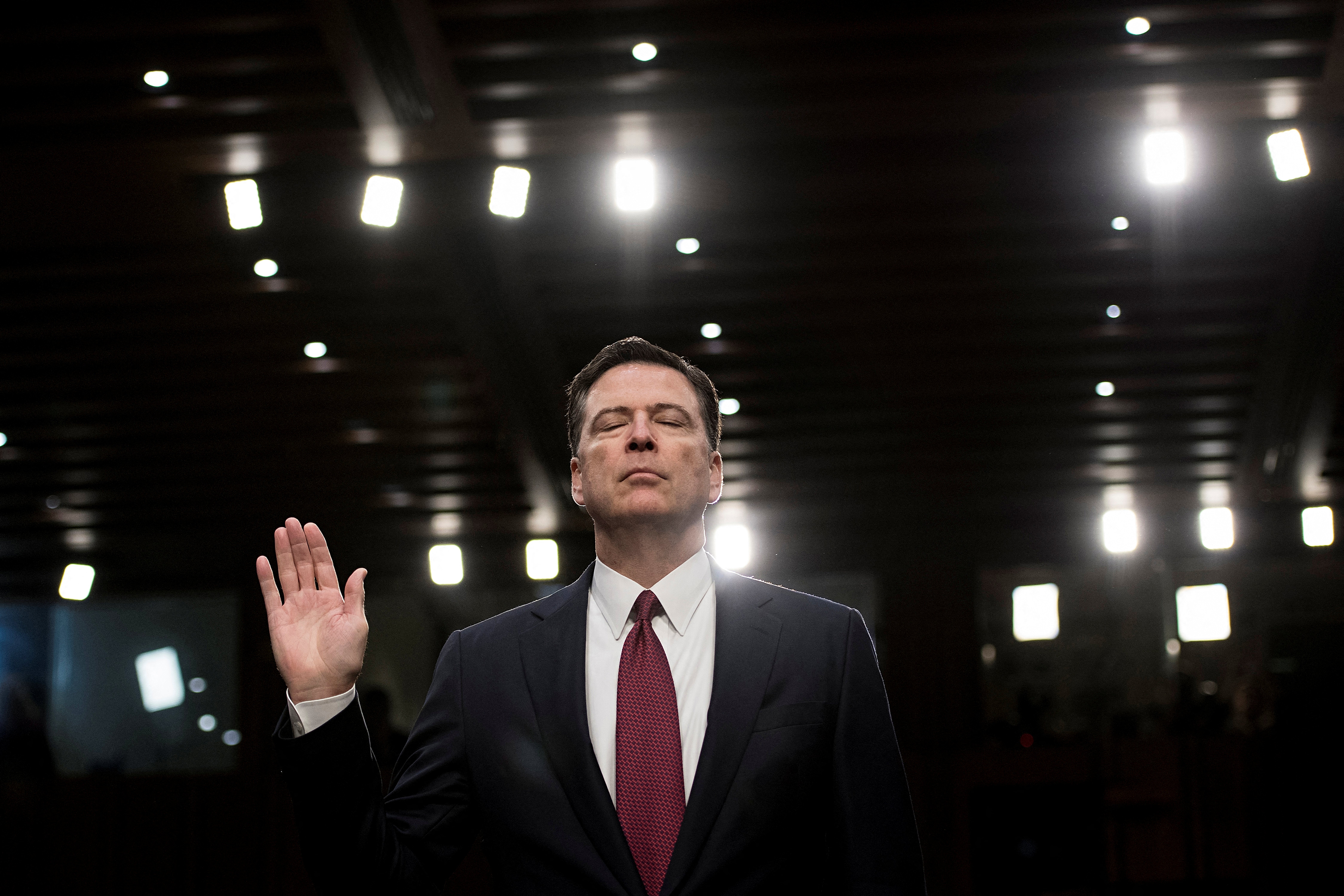Former FBI director James Comey has pleaded not guilty to lying to Congress in a case President Donald Trump demanded the Department of Justice seek, regardless of evidence, against his longtime foe.
Comey made his first appearance in federal court in Alexandria, Virginia, Wednesday to face charges stemming from his testimony to the Senate judiciary committee in 2020, when he denied authorizing leaks to reporters.
“Thank you, your honor,” Comey said inside the courtroom after charges were read. “Thank you very much.”
A trial date is tentatively scheduled to begin 5 January 2026, but Comey’s attorneys are expected to try to have the case thrown out altogether, citing Trump’s “vindictive” prosecution and the president’s installation of his personal attorney to bring the case against him.
Comey’s attorneys are preparing a motion to disqualify Virginia U.S. attorney Lindsey Halligan, and his defense counsel Patrick Fitzgerald said his legal team will also accuse the government of abusing the grand jury process and “outrageous” conduct.
To find him guilty of making false statements to Congress, a jury would have to agree that they believe he knowingly and wilfully deceived senators about an issue material to a question at the center of that 2020 Senate hearing.
The hearing focused on the FBI’s role in the Trump-Russia investigation, although the allegation that Comey made false statements to the committee involves a separate investigation into Hillary Clinton’s foundation in 2016.

Two months into Trump’s first term, Comey announced the FBI was investigating Russia’s efforts to interfere in the 2016 election, and sought to determine if there were “any links between individuals associated with the Trump campaign and the Russian government,” Comey testified at the time.
Comey is now accused of lying about whether he authorized someone at the FBI to be a source for The Wall Street Journal, which published a story about a probe into Trump’s former Democratic opponent that was published in October 2016, shortly before the presidential election, which Trump won.
In the hearing, Republican senator Ted Cruz asked Comey whether he had ever authorized “someone else at the FBI” to be an anonymous source, though Comey said that he stood by previous testimony in which he said that he had not authorized a leak.
The indictment alleges that his testimony was false, and that Comey had authorized another person — which the indictment does not identify — “to serve as an anonymous source in news reports” about the FBI’s investigation into Clinton.
In 2018, an inspector general report sided with Comey’s account after finding that, in 2016, then-deputy FBI director Andrew McCabe authorized FBI personnel to speak to The Wall Street Journal, and then “lacked candor” when Comey and other officials approached him about the source of the leak.
McCabe was fired from the FBI the following month, just days before his scheduled retirement.
Last month, McCabe told CNN that it’s “unbelievable” that law enforcement never reached out to him about the case.
“All I can say is what my own experience revealed, and that is, I didn’t ever see Jim Comey authorizing other people to leak information,” McCabe said.

Comey — whose firing by Trump during his first administration led to the appointment of special counsel Robert Mueller — has long been a target of the president and his allies following his investigation to determine whether Trump’s associates coordinated with Russian figures to interfere with the 2016 presidential election.
“I’m not afraid, and I hope you’re not, either,” Comey said in a video message responding to his indictment last week. “My heart is broken for the Department of Justice, but I have great confidence in the federal judicial system.”
The Russia investigation consumed the president’s first term and cast a shadow over his 2024 campaign and current administration, fueling a campaign of retribution he promised against his perceived political enemies. The case against Comey marks the most significant prosecution of Trump’s alleged adversaries yet, after the president explicitly directed his Justice Department to investigate Comey and others.
Trump, his attorney general Pam Bondi and her radically reshaped Justice Department — now filled with loyalists and attorneys to dominate agencies that the president claims have been weaponized against him — are also targeting prominent Democratic officials, progressive fundraising groups and an array of ideological opponents the administration alleges are tied to acts of terrorism.
Comey, a registered Republican who had worked for the Justice Department since the 1980s, is the first former senior government official facing criminal charges under Trump’s retribution campaign, which the president celebrated on his Truth Social by labeling him “one of the worst human beings this country has ever been exposed to”.
Prosecutors investigating his appearance before the Senate judiciary committee in 2020 have repeatedly rejected bringing criminal charges against him, citing insufficient evidence that he gave false testimony.
According to an internal memo in which career prosecutors explained why they would not seek an indictment, prosecutors determined that a central witness — Comey’s longtime friend Daniel Richmond, a law professor at Columbia University — would prove “problematic” and likely prevent them from establishing a case, according to ABC News.
Richmond’s testimony would result in “likely insurmountable problems” for the prosecution, the memo stated.
But Comey was ultimately charged after Trump successfully pressured the acting head of the U.S. Attorney’s Office for the Eastern District of Virginia to resign.
He then tapped yet another one of his former personal attorneys to the role, despite her lack of prosecutorial experience.
In a highly unusual move, Lindsey Halligan presented the case to a grand jury herself, and the grand jury voted to indict him last month.
Halligan initially sought three charges against Comey, but 12 or more jurors did not find probable cause to indict him. If convicted on the two remaining charges, he faces up to five years in prison.
John Bowden contributed reporting from Alexandria
Pastor shot in the head by ICE agents sues over First Amendment threats
Trump calls for Illinois governor and Chicago mayor to be jailed
Meteorologist behind Trump’s sharpie hurricane fiasco is confirmed to lead NOAA
Change to NHS drug analysis on the table to stave off US tariffs – reports
Is Fox News’ masked antifa guy also its masked Mexican Mafia guy? Here’s the truth
Backlash grows against Border Patrol using rodeos for recruitment drives







